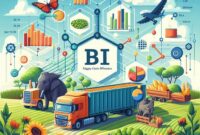The rapid advancement of technology is ushering in a new era for businesses worldwide. Among the most transformative technologies is artificial intelligence (AI). Future tech trends indicate that by 2030, AI will reshape businesses in ways we are only beginning to understand. This article explores the profound impact AI will have on various sectors and how companies can prepare for this inevitable shift.
The Rise of AI in Business
Artificial Intelligence is not just a buzzword; it’s a technological revolution. Companies across different industries are already leveraging AI to enhance productivity, streamline operations, and provide better customer experiences. By 2030, AI is expected to be deeply integrated into the fabric of business operations, driving innovation and creating new business models.
Future Tech Trends: How AI Will Reshape Businesses by 2030
Enhanced Decision-Making
One of the most significant ways AI will reshape businesses is through enhanced decision-making. AI systems can analyze vast amounts of data quickly and accurately, providing insights that human analysts might miss. By 2030, businesses will rely on AI for predictive analytics, helping them anticipate market trends, customer behavior, and potential risks.
Automation of Routine Tasks
Automation is another critical area where AI will have a massive impact. Repetitive tasks that currently require human intervention will be automated, allowing employees to focus on more strategic activities. This shift will not only improve efficiency but also reduce operational costs. For instance, AI-powered chatbots are already handling customer service inquiries, and this trend will only grow by 2030.
Personalized Customer Experiences
AI’s ability to analyze customer data and provide personalized experiences will become even more sophisticated. By 2030, businesses will use AI to offer highly tailored products and services, enhancing customer satisfaction and loyalty. For example, AI-driven recommendation engines will provide personalized product suggestions based on individual preferences and past behaviors.
Transforming Supply Chain Management
The supply chain is another area poised for significant transformation due to AI. Predictive analytics and machine learning algorithms will optimize supply chain operations, from inventory management to logistics. This will result in reduced waste, lower costs, and faster delivery times. Companies that adopt AI in their supply chain processes will have a competitive advantage in the market.
The Impact on Various Sectors
Healthcare
In healthcare, AI will revolutionize patient care and treatment. AI-powered diagnostic tools will provide more accurate and faster diagnoses, while predictive analytics will help in disease prevention and management. By 2030, AI will play a crucial role in personalized medicine, tailoring treatments to individual patients’ genetic profiles and health histories.
Finance
The financial sector is already witnessing the benefits of AI, and this trend will continue to grow. AI will enhance fraud detection, automate trading, and provide personalized financial advice. Additionally, AI-driven risk management systems will help financial institutions mitigate risks more effectively.
Retail
In retail, AI will transform how businesses interact with customers. From personalized shopping experiences to AI-powered inventory management, the retail sector will see significant improvements in efficiency and customer satisfaction. By 2030, AI will enable retailers to predict trends and manage their supply chains more effectively.
Manufacturing
Manufacturing will also undergo a significant transformation due to AI. Predictive maintenance, quality control, and process optimization are areas where AI will have a substantial impact. By 2030, AI-driven automation will lead to more efficient production lines, reducing downtime and increasing output.
Preparing for the AI Revolution
To thrive in the AI-driven future, businesses must start preparing now. Here are some steps companies can take to ensure they are ready for the AI revolution:
Invest in AI Talent
Hiring and training AI specialists is crucial. Companies need professionals who can develop, implement, and manage AI systems. Investing in AI talent will ensure businesses have the expertise needed to leverage AI effectively.
Embrace AI Technologies
Businesses should start adopting AI technologies in their operations. Whether it’s through chatbots, predictive analytics, or machine learning, incorporating AI now will provide a competitive edge and prepare companies for future advancements.
Foster a Culture of Innovation
Encouraging a culture that embraces innovation is vital. Companies should promote experimentation and be willing to take risks. This mindset will help businesses stay ahead of the curve and adapt to technological changes.
Focus on Data
Data is the fuel that powers AI. Businesses should invest in robust data management systems to collect, store, and analyze data effectively. High-quality data will enable AI systems to provide more accurate insights and predictions.
Conclusion
The future of business is inextricably linked to AI. As we approach 2030, AI will reshape various sectors, enhancing decision-making, automating tasks, and providing personalized experiences. Businesses that start preparing for these changes now will be well-positioned to thrive in the AI-driven future. By investing in AI talent, embracing new technologies, fostering innovation, and focusing on data, companies can ensure they are ready to leverage the full potential of AI.
FAQs
What are the key benefits of AI for businesses?
AI offers numerous benefits for businesses, including enhanced decision-making, automation of routine tasks, personalized customer experiences, and improved supply chain management.
How will AI impact employment?
While AI will automate many routine tasks, it will also create new job opportunities in areas such as AI development, data analysis, and machine learning. Employees will need to reskill and adapt to new roles that AI technologies create.
What industries will be most affected by AI?
Healthcare, finance, retail, and manufacturing are among the industries that will be most affected by AI. These sectors will see significant improvements in efficiency, accuracy, and customer satisfaction due to AI integration.
How can businesses prepare for the AI revolution?
Businesses can prepare for the AI revolution by investing in AI talent, embracing AI technologies, fostering a culture of innovation, and focusing on robust data management systems.



